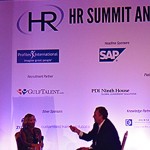The Jakarta HR Performance Forum in retrospect

At the HR Performance Forum in Jakarta, March 16th, 2016, organized by The KPI Institute, in partnership with KPISOFT, a variety of conference topics related to HR and performance management in a company were explored.
One of those topics was “Transforming performance management – Issues and solutions for employee performance engagement systems”, which was was discussed by a diverse panel of speakers, such as Boedi Santoso, Mihai Toma, Yos Rizal Setiawan, Saiful Doeana and Rudy Afandi.
The discussion started off with defining what performance is. Saiful Doeana, HR Director of Vale Indonesia, defined performance as a “link between performance, development, and awards.” Yos Rizal Setiawan, HR Director of 3M Indonesia, believes that it is “the link between [the] gaps of organization.” Boedi Santoso, Director Human Capital of Aerofood ACS Indonesia, agrees with the previous definitions, but adds keywords like: “goals, strategy, communication, and awarding.”
In other words, performance is how one company takes the current situation to the target situation, fulfilling goals and offering rewards, in order to develop its organizational performance.
Moreover, one must also realize the issues of lacking performance. Most of the speakers agreed that it is difficult to assess performance, because some factors cannot be measured. Boedi Santoso agreed that there is a lack of metrics. He stated
“[it is] not only numbers, but how they achieve it, how they can sustain it.”
This essentially means how one can assess an employee based on non-data performance.
Many believe bureaucracy and the company’s system generate barriers. Some of them insist in filling out forms of employee performance, which are credited as unaccountable in measurements. In relation to this, we have the topic of infrequent feedback, which creates a lack of self-improvement drive in employees.
Many speakers agree that to improve performance, one must further engage his/her employees. This can be done with frequent discussions and feedbacks. Ensuring the use of a Balanced Scorecard or adapting the rewards system are also two must-dos.
In conclusion, we can see that more engagement and a shift in the system are generally good things. What is more important, however, is putting the effort in actually implementing changes in the organization.
Image source:

Tags: HR, HR professionals, Human Resources performance





